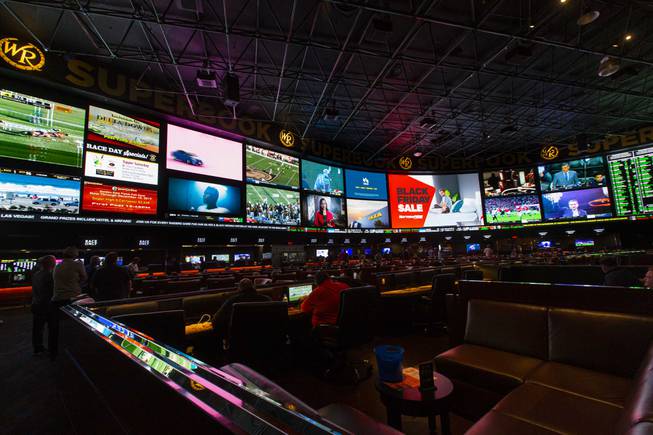
Miranda Alam/Special to the Weekly
The SuperBook at the Westgate in Las Vegas on Saturday, Nov. 16, 2019. Miranda Alam/Special to the Weekly
Wednesday, Nov. 16, 2022 | 2 a.m.
Las Vegas gaming
- Las Vegas airport slot operator surpasses $1 billion in all-time revenue
- Return of international travelers help push Las Vegas visitation back near pre-pandemic levels
- Gaming official: Industry outlook continues to be strong
- Las Vegas casinos, late to the cashless game, appear ready to capitalize with young players
W estgate Las Vegas SuperBook oddsmaker Jay Kornegay believes his sportsbook will someday have a presence in California.
It just won’t be anytime soon, thanks in part to a recent decision by voters in California against legal sports betting.
A pair of sports betting ballot measures — Proposition 26 and Proposition 27 — were soundly rejected by California voters earlier this month, meaning those who had hoped to open the sports betting floodgates in the nation’s most populous state will have to wait.
Proposition 26 asked if voters would allow in-person sports betting at tribal casinos and horse racing tracks in the state.
The other ballot measure would have allowed for online sports wagering for those age 21 and up. Part of the proceeds from revenues gained if that question had passed would have gone toward helping homeless people in the California.
The measures failed despite a blitz of advertising. About $460 million was spent as part of competing efforts related to the propositions, according to The Associated Press.
“We want to operate in California and, believe me, we will operate in California when it’s all said and done,” said Kornegay, the SuperBook’s vice president of race and sports operations. “I think it’s inevitable that sports wagering will be legalized in California. It’s just a matter of time.”
Leading up to Election Day, Kornegay said he thought the ballot measures would likely fail, which seemed to be the conventional wisdom within the sports betting world.
The fact that two sports betting measures were on the ballot might have hindered the efforts of supporters of both.
That’s partially because voters were “hammered” with advertising messages from both sides of the debate in the months leading up to Election Day, said Mark DiCamillo, director of a poll conducted by the University of California, Berkeley Institute of Governmental Studies.
“They really should have gotten together and had one initiative,” DiCamillo said.
One institute poll from February, cosponsored by the Los Angeles Times, showed voters were split on whether they would support sports betting, DiCamillo said.
“The two sides were all over the airwaves for months,” DiCamillo said. “What do you expect? Both campaigns were trying to defeat each other; they were shooting at each other. After these campaigns heated up, it was definitely a no from voters. We found broad opposition in every subgroup we could find.”
In recent years, legalized sports betting has proliferated across the country. Over 30 states now allow sports betting in some form.
Some people were concerned the expansion would hurt Las Vegas, which for years enjoyed a legal gambling advantage.
That thinking seems to have become old fashioned, however, said Anthony Cabot, a distinguished fellow in gaming law at UNLV’s Boyd School of Law.
In 2019, before the pandemic, Las Vegas drew over 42 million visitors, according to the city’s convention and tourism bureau.
This year, the visitor total will likely fall short of that number, but it won’t be by much.
Through August, the city had attracted 25.2 million visitors this year, according to the Las Vegas Convention and Visitors Authority. Many of them came from neighboring California.
On the sports betting side, people living in or visiting Nevada are still betting a lot.
Nevada sportsbooks through September have brought in $5.9 billion in wagers this year, up 21% from the same period in 2021, according to the state’s Gaming Control Board.
“Whether or not California gets sports wagering, it doesn’t matter for Las Vegas,” Cabot said. “I don’t think people necessarily come here to place a wager. They come here because it’s Vegas. If you’ve ever been to a Vegas sportsbook for March Madness or for the Super Bowl, you know that people come for that experience.”
Kornegay agreed.
“Despite all the sports wagering that’s been legalized across the country, if you look at the numbers over the past couple of years in Nevada — and this is in spite of the pandemic — there have been records set,” Kornegay said. “I’ve talked to a number of guests who continue to come to our venue. They’ll say that, yes, they have sports wagering at home now but that there’s still nothing like Vegas. You cannot emulate Las Vegas.”
Still, the fact that California won’t have sports betting any time soon can’t be bad for Las Vegas, said John Moran Jr., an attorney with the Clark Hill law firm in Las Vegas and former chairman of the Nevada Gaming Commission.
“From a Nevada gaming perspective, I think what happened in California is a good thing,” Moran said. “There’s still a question about what could happen in the future there, but sports betting will remain popular in Nevada.”
For SuperBook Sports, which operates in six states, the California market would not have been an option right away, even if Proposition 27 had passed. California would have required operators to have operations in at least 10 states.
“If and when something gets done in California, I think it would have a minimal role on Las Vegas,” Kornegay said. “There’s the proximity between Las Vegas and California, yes, but (legalization in California) might just have the reverse effect. More sports bettors could mean more people will be enticed to come to Las Vegas, whether it’s for a sportsbook experience or a Raiders or Golden Knights game.”
